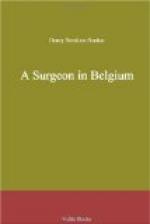As we approached Contich a soldier came running up and told us that two people had just been injured by a shell, and begged us to come to see them. He stood on the step of the car, and directed us to a little row of cottages half a mile farther on. At the roadside was a large hole in the ground where a shell had fallen some minutes before, and beside it an unfortunate cow with its hind-quarters shattered. In the garden of the first cottage a poor woman lay on her back. She was dead, and her worn hands were already cold. As I rose from my knees a young soldier flung himself down beside her, sobbing as though his heart would break. She was his mother.
Behind the cottage we found a soldier with his left leg torn to fragments. He had lost a great deal of blood, and he was still bleeding from a large artery, in spite of the efforts of a number of soldiers round who were applying tourniquets without much success. The ordinary tourniquet is probably the most inefficient instrument that the mind of man could devise—at least, for dealing with wounds of the thigh out in the field. It might stop haemorrhage in an infant, but for a burly soldier it is absurd. I tried two of the most approved patterns, and both broke in my hands. In the end I managed to stop it with a handkerchief and a stick. I would suggest the elimination of all tourniquets, and the substitution of the humble pocket-handkerchief. It, at least, does not pretend to be what it is not. Between shock and loss of blood our soldier was pretty bad, and we did not lose much time in transferring him to our car on a stretcher. The Croix Rouge dressing-station was more than a mile farther on, established in a large villa in its own grounds. We carried our man in, and laid him on a table with the object of dressing his leg properly, and of getting the man himself into such condition as would enable him to stand the journey back to Antwerp.
Alas! the dressing-station was destitute of any of the most elementary appliances for the treatment of a seriously wounded man. There was not even a fire, and the room was icy cold. There was no hot water, no brandy, no morphia, no splints, and only a minute quantity of dressing material. A cupboard with some prehistoric instruments in it was the only evidence of surgery that we could find. The Belgian doctor in charge was doing the best he could, but what he could be expected to do in such surroundings I do not know. He seemed greatly relieved to hear that I was a surgeon, and he was most kind in trying to find me everything for which I asked. From somewhere we managed to raise some brandy and hot water, and a couple of blankets, and with the dressings we had brought with us we made the best of a bad job, and started for home with our patient. Antwerp was eight miles away. It was a bitterly cold evening, and darkness was coming on. It seemed improbable that we could get our patient home alive, but it was perfectly certain that he would die




